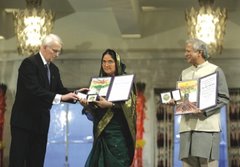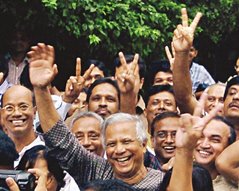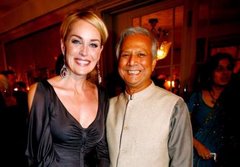
“I want to congratulate Dr. Muhammad Yunus on winning this year’s Nobel Peace Prize. About twenty years ago, Dr. Yunus traveled to Arkansas to help Bill and me set up microcredit programs in the United States. Since that time, in my travels in Bangladesh and around the world, I have had the opportunity to meet many of those who are participants in Grameen’s programs and hear their stories of the ways in which these loans have transformed their lives. I continue to be inspired by the beneficial impact of these projects on low-income women and their families, and I, like others, have nominated Dr. Yunus for this prize multiple times. With just a small amount of money, those trapped by poverty have a chance to invest in items, such as livestock or materials for handicrafts, which can lead to economic self-sufficiency. Through microcredit programs, the world's poorest people are leading their families, their communities and their countries to a better future – a future that Dr. Yunus has been instrumental in creating. I would like to thank him for all his work, and congratulate him once again.”






